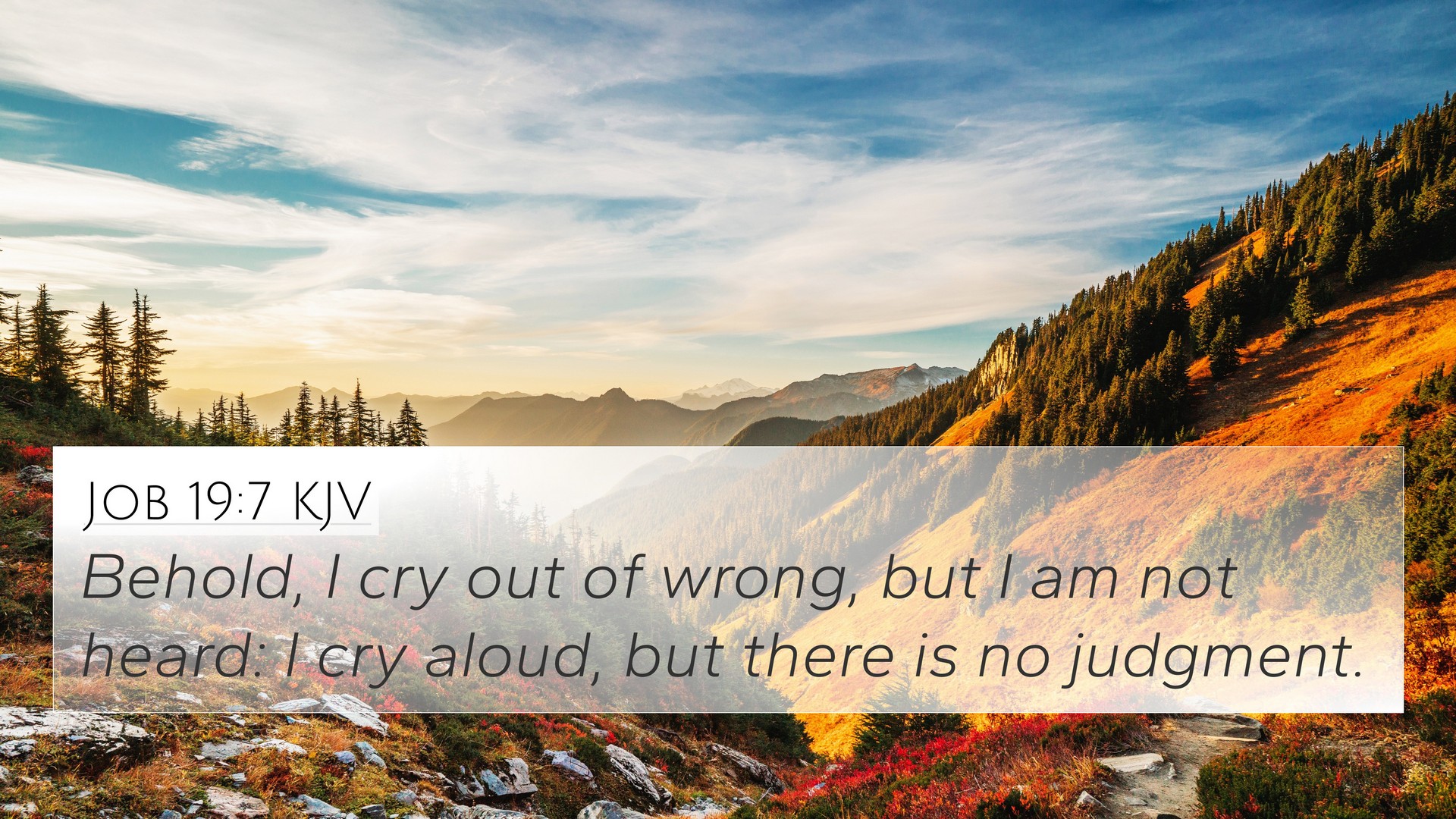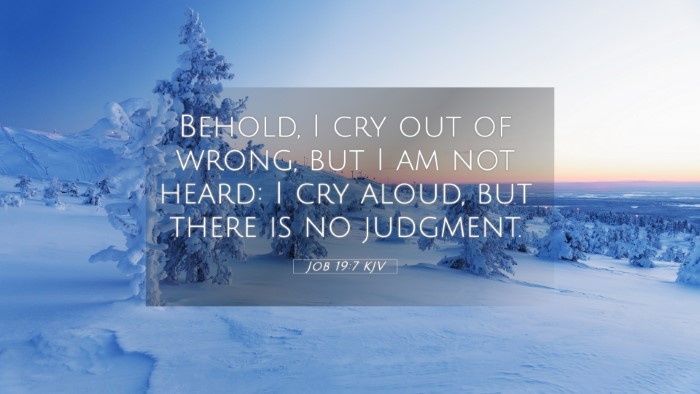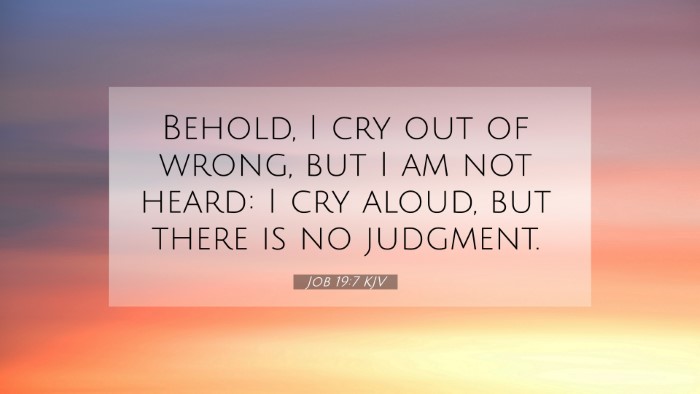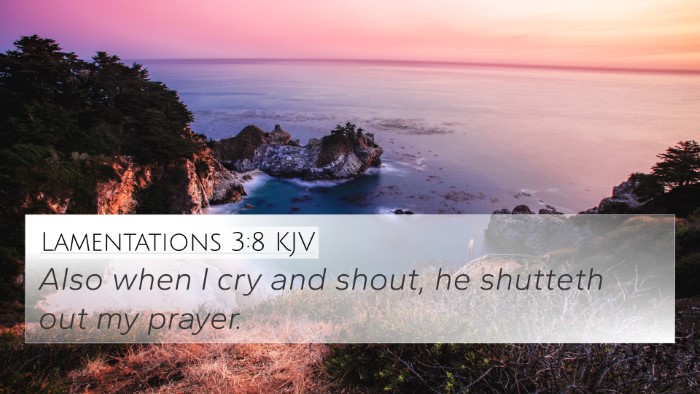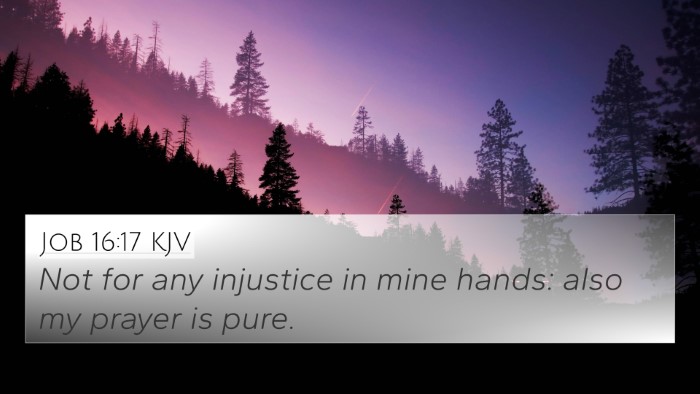Old Testament
Genesis Exodus Leviticus Numbers Deuteronomy Joshua Judges Ruth 1 Samuel 2 Samuel 1 Kings 2 Kings 1 Chronicles 2 Chronicles Ezra Nehemiah Esther Job Psalms Proverbs Ecclesiastes Song of Solomon Isaiah Jeremiah Lamentations Ezekiel Daniel Hosea Joel Amos Obadiah Jonah Micah Nahum Habakkuk Zephaniah Haggai Zechariah MalachiJob 19:7 Similar Verses
Job 19:7 Cross References
Behold, I cry out of wrong, but I am not heard: I cry aloud, but there is no judgment.
Uncover the Rich Themes and Topics of This Bible Verse
Listed below are the Bible themes associated with Job 19:7. We invite you to explore each theme to gain deeper insights into the Scriptures.
Job 19:7 Cross Reference Verses
This section features a detailed cross-reference designed to enrich your understanding of the Scriptures. Below, you will find carefully selected verses that echo the themes and teachings related to Job 19:7 KJV. Click on any image to explore detailed analyses of related Bible verses and uncover deeper theological insights.
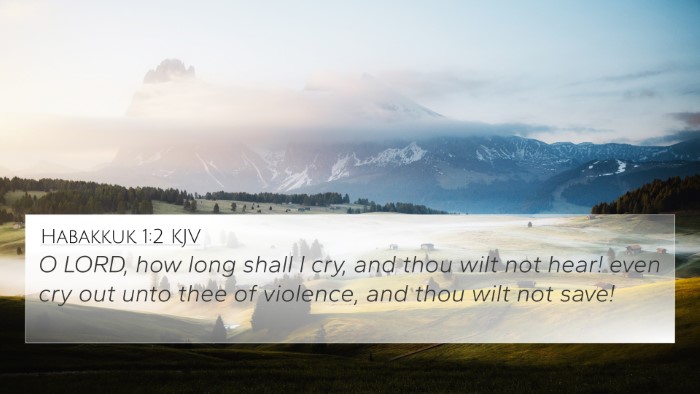
Habakkuk 1:2 (KJV) »
O LORD, how long shall I cry, and thou wilt not hear! even cry out unto thee of violence, and thou wilt not save!
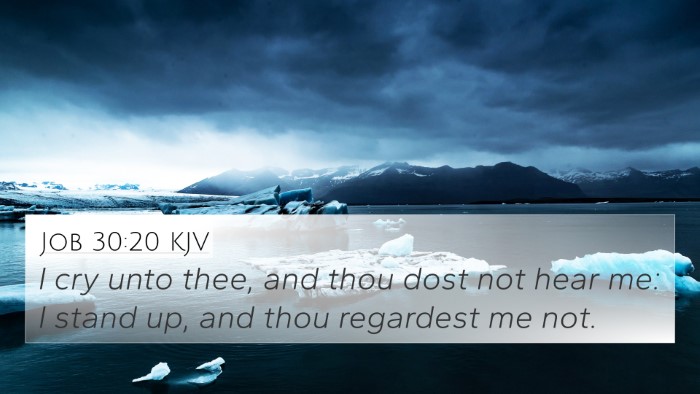
Job 30:20 (KJV) »
I cry unto thee, and thou dost not hear me: I stand up, and thou regardest me not.
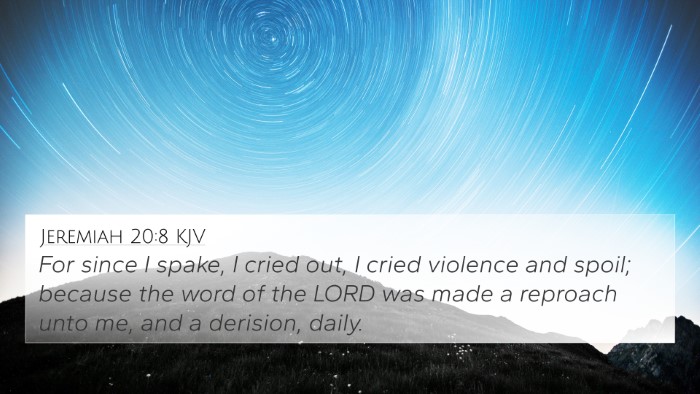
Jeremiah 20:8 (KJV) »
For since I spake, I cried out, I cried violence and spoil; because the word of the LORD was made a reproach unto me, and a derision, daily.
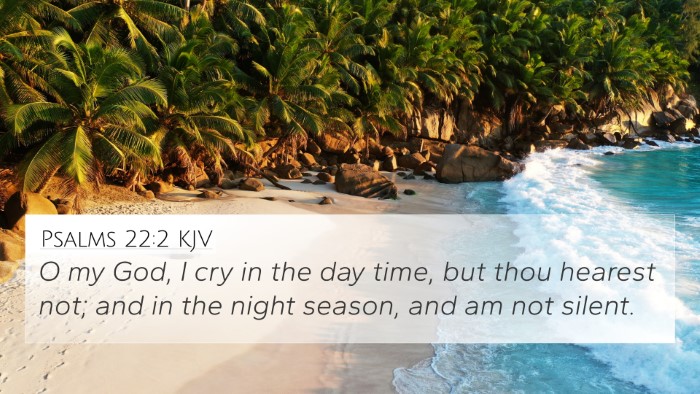
Psalms 22:2 (KJV) »
O my God, I cry in the day time, but thou hearest not; and in the night season, and am not silent.

Job 13:15 (KJV) »
Though he slay me, yet will I trust in him: but I will maintain mine own ways before him.
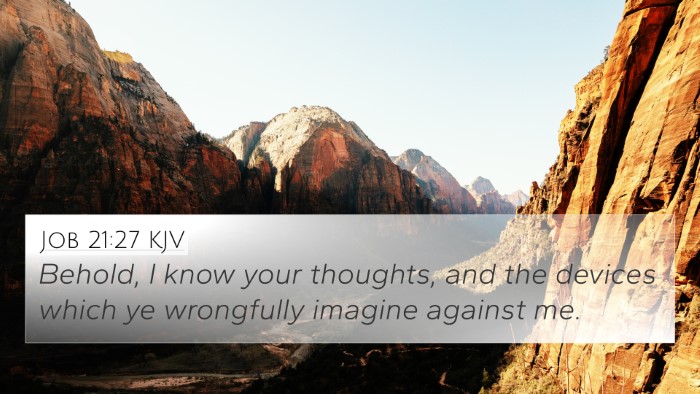
Job 21:27 (KJV) »
Behold, I know your thoughts, and the devices which ye wrongfully imagine against me.
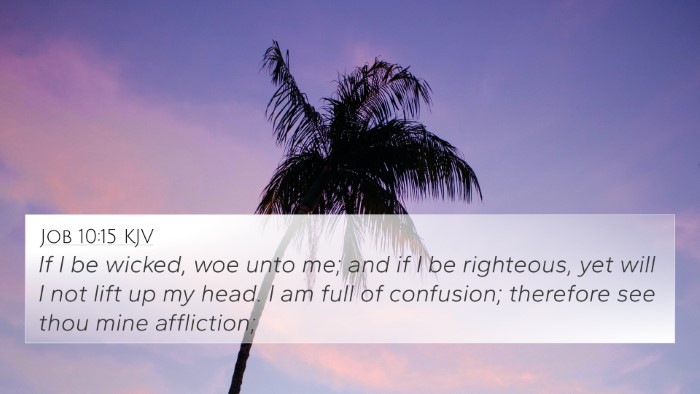
Job 10:15 (KJV) »
If I be wicked, woe unto me; and if I be righteous, yet will I not lift up my head. I am full of confusion; therefore see thou mine affliction;

Job 40:8 (KJV) »
Wilt thou also disannul my judgment? wilt thou condemn me, that thou mayest be righteous?

Job 9:32 (KJV) »
For he is not a man, as I am, that I should answer him, and we should come together in judgment.
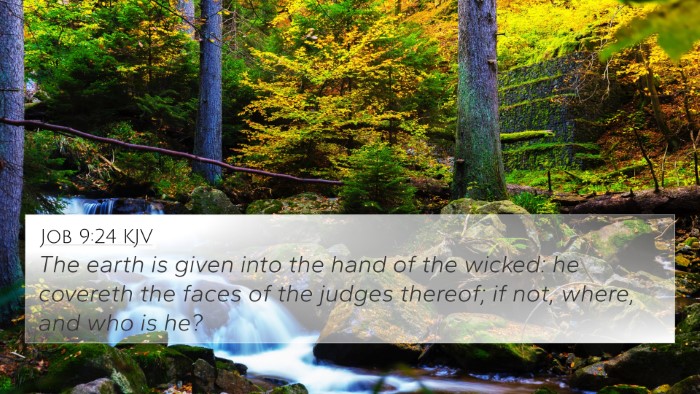
Job 9:24 (KJV) »
The earth is given into the hand of the wicked: he covereth the faces of the judges thereof; if not, where, and who is he?

Job 31:35 (KJV) »
Oh that one would hear me! behold, my desire is, that the Almighty would answer me, and that mine adversary had written a book.
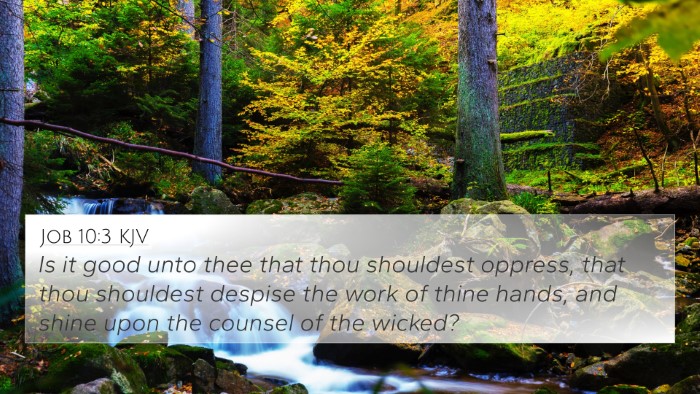
Job 10:3 (KJV) »
Is it good unto thee that thou shouldest oppress, that thou shouldest despise the work of thine hands, and shine upon the counsel of the wicked?
Job 19:7 Verse Analysis and Similar Verses
Understanding Job 19:7
Bible Verse: Job 19:7 - "Behold, I cry out of wrong, but I am not heard: I cry aloud, but there is no judgment."
Summary of the Verse
In Job 19:7, Job expresses profound despair over the lack of justice in his suffering. He is crying out for help and resolution but feels that his pleas go unheard. This verse captures the essence of Job’s suffering and his struggle with the silence of God in times of injustice.
Commentary Insights
Matthew Henry's Commentary
Henry emphasizes that Job feels deeply wronged and believes that his cries for help and justice are ignored. His lament reflects a sense of urgency and desperation as he seeks acknowledgment of his plight. This verse showcases the theme of human suffering and the quest for divine justice, a resonant theme throughout Scripture.
Albert Barnes' Notes
Barnes elaborates on the emotional depth of Job's cry, noting that his feeling of abandonment by God compounds his suffering. He points out that Job’s lament indicates a critical moment in his argument for justice, where he feels the weight of his afflictions pressing down on him without any relief or recognition from God or his peers.
Adam Clarke's Commentary
Clarke interprets the verse as a profound expression of Job's despair. He highlights Job's honesty in his feelings of neglect. This anguish is not just about his physical suffering but also touches on the spiritual crisis he faces, questioning his relationship with God in the face of seemingly unanswered prayers.
Thematic Connections
Job 19:7 serves as a pivotal moment that encapsulates the theme of suffering and the quest for divine justice. Below are some thematic connections and cross-references:
- Psalm 22:2: "O my God, I cry in the daytime, but thou hearest not; and in the night season, and am not silent." - This verse similarly expresses feelings of abandonment and unanswered prayer.
- Lamentations 3:8: "Also when I cry and shout, he shutteth out my prayer." - A parallel in the theme of voicing suffering without acknowledgment.
- Isaiah 58:3: "Wherefore have we fasted, say they, and thou seest not? wherefore have we afflicted our soul, and thou takest no knowledge?" - Reflects on the silence of God in the context of communal suffering.
- Ecclesiastes 3:16: "And moreover I saw under the sun the place of judgment, that wickedness was there; and the place of righteousness, that iniquity was there." - Points to the frustration of perceived injustice in the world.
- Psalm 13:1: "How long wilt thou forget me, O Lord? for ever? how long wilt thou hide thy face from me?" - Similar in tone to Job’s lamentation and deep anguish.
- Jeremiah 20:8-9: "For since I spake, I cried out; I cried violence and spoil; because the word of the Lord was made a reproach unto me..." - Another prophet expressing feelings of frustration and isolation in suffering.
- Romans 8:18: "For I reckon that the sufferings of this present time are not worthy to be compared with the glory which shall be revealed in us." - Offers a New Testament perspective on suffering and expectation of divine justice.
- Hebrews 4:15: "For we have not an high priest which cannot be touched with the feeling of our infirmities; but was in all points tempted like as we are, yet without sin." - Points to the empathetic nature of Christ amidst our sufferings.
- 1 Peter 5:7: "Casting all your care upon him; for he careth for you." - Encourages believers to bring their sufferings to God, contrasting with Job's feeling of neglect.
Cross-Referencing Themes in Job 19:7
This verse offers a rich ground for cross-referencing and exploring inter-Biblical dialogue. The insights drawn from other scriptures enhance our understanding of despair, justice, and the quest for divine presence in our suffering. By utilizing tools for Bible cross-referencing, one can uncover deeper meanings and connections within the biblical narrative.
Tools for Further Study
To dive deeper into biblical connections and interpretations, consider these tools:
- Bible Concordance: A tool that lists words alphabetically with their occurrences, helping to identify relevant verses.
- Bible Cross-Reference Guide: A guide that outlines connections between various scriptures across the Bible.
- Cross-Reference Bible Study: A systematic approach to studying interrelated verses to understand themes and doctrines.
- Bible Chain References: A method to trace thematic or doctrinal chains through the scriptures.
- Comprehensive Bible Cross-Reference Materials: Resources that compile extensive cross-referenced themes and verses.
Conclusion
Job 19:7 serves not only as a poignant expression of human despair but also invites readers to explore the broader narrative of suffering and divine justice through cross-referenced insights. By identifying connections between pertinent scriptures, one can gain a deeper understanding of God’s nature and the human experience amidst trials.
